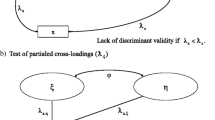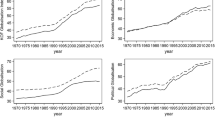Abstract
Happiness research is one of the most vivid and fruitful parts of modern economics. The focus is on empirical findings. In contrast, theoretical work has been rather neglected. The paper deals with three areas needing more analytical work: the choice or imposition of comparison or reference groups; and the extent, speed and symmetry of adaptation to positive and negative shocks on happiness. In both areas, theoretical propositions are derived which can in the future be empirically tested. The third area relates to the political economy of happiness. Many governments intend to take the happiness index as a criterion of how successful their policies are. As a consequence, survey respondents get an incentive to misrepresent their happiness level, and governments to manipulate the aggregate happiness indicator in their favor. A country’s constitution must induce governments to carefully observe human rights, democracy, the decentralization of political decision making, and market institutions and provide people with the possibility to acquire a good education and find a suitable job.
Similar content being viewed by others
Notes
Following the literature, the word “happiness” is used for convenience to denote the more scientific term “subjective well-being”. This paper deals more narrowly with “life satisfaction” derived from the answers to the survey question: “Taken overall, how satisfied are you with the life you lead”. In the case of employment relationships, happiness is identified with job satisfaction.
References
Abdel-Khalek AM (2006) Measuring happiness with a single-item scale. Soc Behav Personal 34:139–150
Becchetti L, Pelloni A (2013) What are we learning from the life satisfaction literature? Int Rev Econ 60:113–155
Benesch C, Frey BS, Stutzer A (2010) TV channels, self-control and happiness. BE J Econ Anal Policy 10:1–33
Card D, Mas A, Moretti E, Saez E (2012) Inequality at work: the effect of peer salaries on job satisfaction. AER 102:2981–3003
Clark AE (2003) Unemployment as a social norm: psychological evidence from panel data. J Labor Econ 21:323–351
Clark AE, Senik C (2010) Who compares to whom? The anatomy of income comparisons in Europe. Econ J 120:573–594
Clark AE, Diener E, Georgellis Y, Lucas RE (2008) Lags and leads in life satisfaction: a test of the baseline hypothesis. Econ J 118:222–243
Danner DD, Snowdon DA, Friesen WV (2001) Positive emotions in early life and longevity: findings from the nun study. J Personal Soc Psychol 80:804–813
De Neve JE, Oswald A (2012) Estimating the influence of life satisfaction and positive affect on later income using sibling fixed effects. PNAS 109:19953–19958
Deaton A (2008) Income, health and wellbeing around the world: evidence from the Gallup World Poll. J Econ Perspect 22:53
Dolan P, Peasgood T, White M (2008) Do we really know what makes us happy? A review of the economic literature on the factors associated with subjective well-being. J Econ Psychol 29:94–122
Frey BS, Gallus J (2012) Happiness policy and economic development. Int J Happiness Dev 1:102–111
Frey BS, Gallus J (2013a) Subjective well-being and policy. Topoi 32(2):207–212
Frey BS, Gallus J (2013b) Political economy of happiness. Appl Econ 45:4205–4211
Frey BS, Steiner L (2012) Glücksforschung: Eine empirische Analyse. AStA 6:9–25
Frey BS, Stutzer A (2002) What can economists learn from happiness research? J Econ Lit 40:402–435
Frey BS, Stutzer A (2005a) Happiness research: state and prospects. Rev Soc Econ 63:207–228
Frey BS, Stutzer A (2005b) Does the political process mitigate or accentuate individual biases due to mispredicting future utility? In: McCaffey E, Slemrod J (eds) Behavioral public finance: toward a new agenda. Russell Sage Foundation, New York, pp 1–44
Frey BS, Stutzer A (2009) Should national happiness be maximized? In: Dutt AK, Radcliff B (eds) Happiness, economics and politics: towards a multi-disciplinary approach. Edward Elgar, Northampton, pp 301–323
Frey BS, Stutzer A (2012) The use of happiness research for public policy. Soc Choice Welf 38:659–674
Frey BS, Luechinger S, Stutzer A (2009) The life satisfaction approach to valuing public goods: the case of terrorism. Public Choice 138:317–345
Gardner J, Oswald AJ (2007) Money and mental wellbeing: a longitudinal study of medium-sized lottery wins. J Health Econ 26:49–60
Kahneman D (2003) Objective happiness. In: Kahneman D, Diener E, Schwarz N (eds) Well-being: the foundations of hedonic psychology. Russell Sage Foundation, New York, pp 3–25
Luttmer EFP (2005) Neighbors as negatives: relative earnings and well-being. QJE 120:963–1002
McCloskey DN, Ziliak ST (1996) The standard error of regressions. J Econ Lit 34:97–114
Odermatt R, Stutzer A (2013) Smoking bans, cigarette prices and life satisfaction. IZA Discussion Paper 7177
Oswald AJ, Powdthavee N (2008) Does happiness adapt? A longitudinal study of disability with implications for economists and judges. J Public Econ 92:1061–1077
Senik C (2005) Income distribution and well-being: what can we learn from subjective data? J Econ Surv 19:43–63
Stevenson B, Wolfers J (2008) Economic growth and subjective well-being: Reassessing the Easterlin paradox. Brookings Pap Econ Act 39:1–102
Stevenson B, Wolfers J (2013) Subjective well-being and income: Is there any evidence of satiation? NBER Working Paper 18992
Stroebe M, van Son M, Stroebe W, Kleber R, Schut H, van den Bout J (2000) On the classification and diagnosis of pathological grief. Clin Psychol Rev 20:57–75
Stutzer A (2009) Happiness when temptation overwhelms willpower. In: Dutt AK, Radcliff B (eds) Happiness, economics, and politics: toward a multi-disciplinary approach. Edward Elgar, Cheltenham, pp 97–126
Stutzer A, Frey BS (2010) Recent advances in the economics of individual subjective well-being. Soc Res 77:679–714
Veenhoven R (2003) Hedonism and happiness. J Happiness Stud 4:437–457
Winkelmann R (2012) Conspicuous consumption and satisfaction. J Econ Psychol 33:183–191
Ziliak ST, McCloskey DN (2008) The cult of statistical significance: how the standard error costs us jobs, justice, and lives. University of Michigan Press, Ann Arbor
Author information
Authors and Affiliations
Corresponding author
Rights and permissions
About this article
Cite this article
Frey, B.S., Gallus, J. & Steiner, L. Open issues in happiness research. Int Rev Econ 61, 115–125 (2014). https://doi.org/10.1007/s12232-014-0203-y
Received:
Accepted:
Published:
Issue Date:
DOI: https://doi.org/10.1007/s12232-014-0203-y




